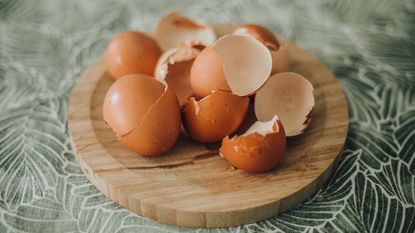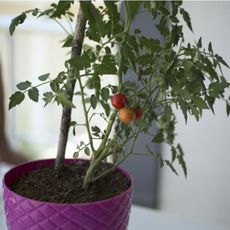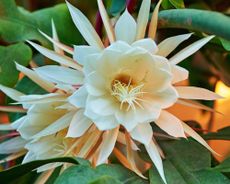7 Most Surprising Fertilizers Found In Your Kitchen


It's no secret that as gardeners we all want healthy plants. While healthy soil is vital to this, fertilization plays a significant role too. But what if you don't have lots of money to spend on plant fertilizer? That's not a problem. There are actually a number of "fertilizers" that may already be available right at your fingertips - and they're all found in the kitchen!
Here are 7 surprising household fertilizers that you can use in the garden that won't cost you any extra:
1. Milk - Got milk? You probably didn't know that milk isn't just good for you but also your plants. In fact, using milk as fertilizer is an old-time remedy from long ago. It's a great source of calcium but also contains beneficial proteins, vitamin B, and sugars that benefit plants, improving their overall health and yields.
You can use fresh or outdated milk, evaporated milk, or even powdered milk. Just be sure to dilute it with water, at least 50/50. Use this as a foliar spray or pour around the base of plants where the roots will gradually absorb the milk. If using powdered milk, simply sprinkle into the soil and water in.
2. Gelatin - "Watch it wiggle, see it jiggle." That's right, I'm talking about Jell-O, or more specifically, unflavored gelatin. This is actually a great fertilizer for houseplants and other foliage plants in the garden. Why? Gelatin is essentially a form of collagen made from animal bones, skins, and the like, and is a great source of nitrogen, promoting healthy plant development and growth.
You'll want to dilute this with plenty of water - one packet to a quart of water (typically dissolving the package of gelatin in a cup of hot water, then adding 3 cups of cold water). Pour directly on the soil around your plants once a month.
3. Eggshells - Most of us know that calcium builds strong bones, but did you know that plants benefit from this nutrient too? Eggshells are loaded with calcium as well as small amounts of nitrogen, phosphoric acid, and other trace elements. As a fertilizer, this helps increase cell division and promote stronger, healthier growth. It can also help reduce blossom end rot in tomatoes.
Gardening tips, videos, info and more delivered right to your inbox!
Sign up for the Gardening Know How newsletter today and receive a free download of our most popular eBook "How to Grow Delicious Tomatoes."
Wash and crush the eggshells (you can even toss in the blender and grind), and then sprinkle onto your garden soil or add them to your compost pile. Likewise, you can make your own calcium fertilizer spray. Fill a gallon jar with water and eggshells, steeping for about a month. Mix 1 cup of the solution with 1 quart of water in a spray bottle and use as a foliar spray.
Note: You can also use leftover water from boiling eggs to attain the same results.
4. Cooking water - And speaking of boiling water, this too (cooled down, of course) can make an excellent fertilizer for garden plants. Water that's been used to boil potatoes, vegetables, eggs, and pasta is actually filled with nutrients, such as phosphorus, nitrogen, iron, calcium, and others. Now, instead of pouring that useful cooking water down the drain, allow it to cool off and give your plants a drink. They will thank you for it with healthier growth. It's especially beneficial to houseplants, but any plant can benefit from this low-cost fertilizer.
5. Coffee - Life wouldn't be bearable without that morning coffee and your plants will appreciate it too. Using coffee grounds as a fertilizer adds organic matter to the soil, improving overall drainage, water retention and aeration. It also contains about two percent nitrogen. Coffee grounds are said to be good for acid-loving plants too. Just keep in mind that this is only true for unwashed coffee grounds - fresh grounds are acidic while used grounds are nearly neutral.
The best way to use your coffee grounds is to compost them but you can also scatter them on top of the soil around your plants and water in. And, in addition to adding nutrients, if you're wanting to give those acid lovers a boost, don't toss that leftover coffee. Using diluted coffee as a fertilizer can increase the acidity of the soil since it has a pH of 5.2 to 6.9.
6. Bananas - Bananas are not only healthy for us, but they can benefit plants too. Bananas are an excellent source of potassium and great for soil. They can also provide plants with phosphorus. While some sources say to simply lay the banana peels directly on the soil to leach nutrients into the ground, it's usually recommended that banana peels be composted first, generally cutting them up into smaller pieces where they can break down quicker.
You can, however, forgo the composting and make a homemade liquid fertilizer instead. Just chop up all some banana peels, put them in a jar of water, and allow this to sit for about a week or so. Then water your plants with it, tossing those remaining peels in the compost heap.
7. Vinegar - Okay, we know that vinegar is great for many things, and in the garden, white vinegar makes a good organic herbicide. But what you likely didn't know is that apple cider vinegar (with 5 percent acidity) can be used as a fertilizer to maintain healthy plants. That's right! Just a tablespoon of vinegar (one tablespoon of vinegar to one gallon of water) can boost a plant's defense mechanism, helping it fend off insect pests and microbes.
It also accelerates germination and increases yields. Pour the diluted vinegar/water mixture onto the soil around your plants to help keep them healthy and happy.
BONUS: Just another helpful FYI for those of you having fish aquariums (freshwater only, no saltwater). As you're cleaning out the tank, don't toss that water. Instead, use it to give your houseplants some much needed love. It's rich in beneficial bacteria, potassium, phosphorus, nitrogen, and trace nutrients that help promote lush, healthy growth. And the fish waste makes a great plant fertilizer too.

Nikki Tilley has been gardening for nearly three decades. The former Senior Editor and Archivist of Gardening Know How, Nikki has also authored six gardening books.
-
 7 Best Dwarf Tomato Plants
7 Best Dwarf Tomato PlantsHave a tiny growing space? Look for dwarf tomato seeds so you don’t miss out on summer’s juicy bounty.
By Susan Albert
-
 5 Night-Blooming Houseplants – Grow An Indoor Moon Garden
5 Night-Blooming Houseplants – Grow An Indoor Moon GardenThere is something uniquely special about night-blooming houseplants. Set the scene for a magical evening indoors with these fragrant flowering beauties.
By Amy Grant